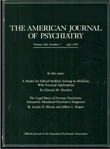TO THE EDITOR: I would agree with Mr. Thakur regarding the basic assumptions of our article on readmission to the psychiatric hospital. I do have concerns regarding some aspects of his suggestions. First, it is accurate to state that our research was based, in part, on the assumption that providers and payers agree that treatment is not a goal of inpatient care. There is little time during brief hospitalizations to engage in treatment, particularly of severe and persistent mental illness. I do not think this is a particularly controversial assumption, at least in the United States. However, it is important to note again, as we stated in the article, that this logic does not hold for systems of care. There may be circumstances in which readmission rates to the psychiatric hospital are useful quality indicators for integrated systems of care.
On the second point, I do not think that the absence of an association between length of stay and readmission is evidence that “poor-quality inpatient service can make it harder for a client to live in the community.” The actual association we were testing (by controlling for severity of illness) was whether persons discharged sooner than expected (on the basis of admission characteristics) were more likely to be readmitted. This was done to study the common criticism that utilization management results in “sicker and quicker” discharges. One claim is that these individuals are more likely to need more services later. We found no evidence of that for psychiatric inpatients, and we used this as additional evidence that readmission was not related to inpatient outcome. Mr. Thakur's idea of using the absence of association as an indicator in and of itself is intriguing but seems problematic conceptually. A letter does not provide space for the full elaboration of the inherent difficulties with this idea, but a large subset of the logical problems are similar to those of proving a null hypothesis. Demonstration of the presence of a relationship based on inductive statistics has a different standard of evidence than does demonstration of the absence of a relationship.
Mr. Thakur is not correct when he argues that “readmission is a direct measure of our goal of clients living in the community.” Community tenure is a direct measure, as are many quality-of-life measures. Hospital admissions generally can be used as indirect measures of community tenure, but then so can nursing home placements and other institutional options. A focus on hospital readmissions as a quality indicator is not likely to help people with severe and persistent mental illness remain in the community. When used inappropriately, it can create disincentives for providers to take on the challenge of managing the cases of difficult-to-treat patients.
Mr. Thakur makes some excellent statistical suggestions about more sophisticated approaches to the analysis of these data. These techniques require large samples and a statistically sophisticated readership. We are working toward incorporating survival analysis and decision-tree analyses into a growing database. However, given the current emphasis on implementing outcome measures now, we felt that the analytic approach used in our study was both appropriate to the study group and understandable to our primary audience.

